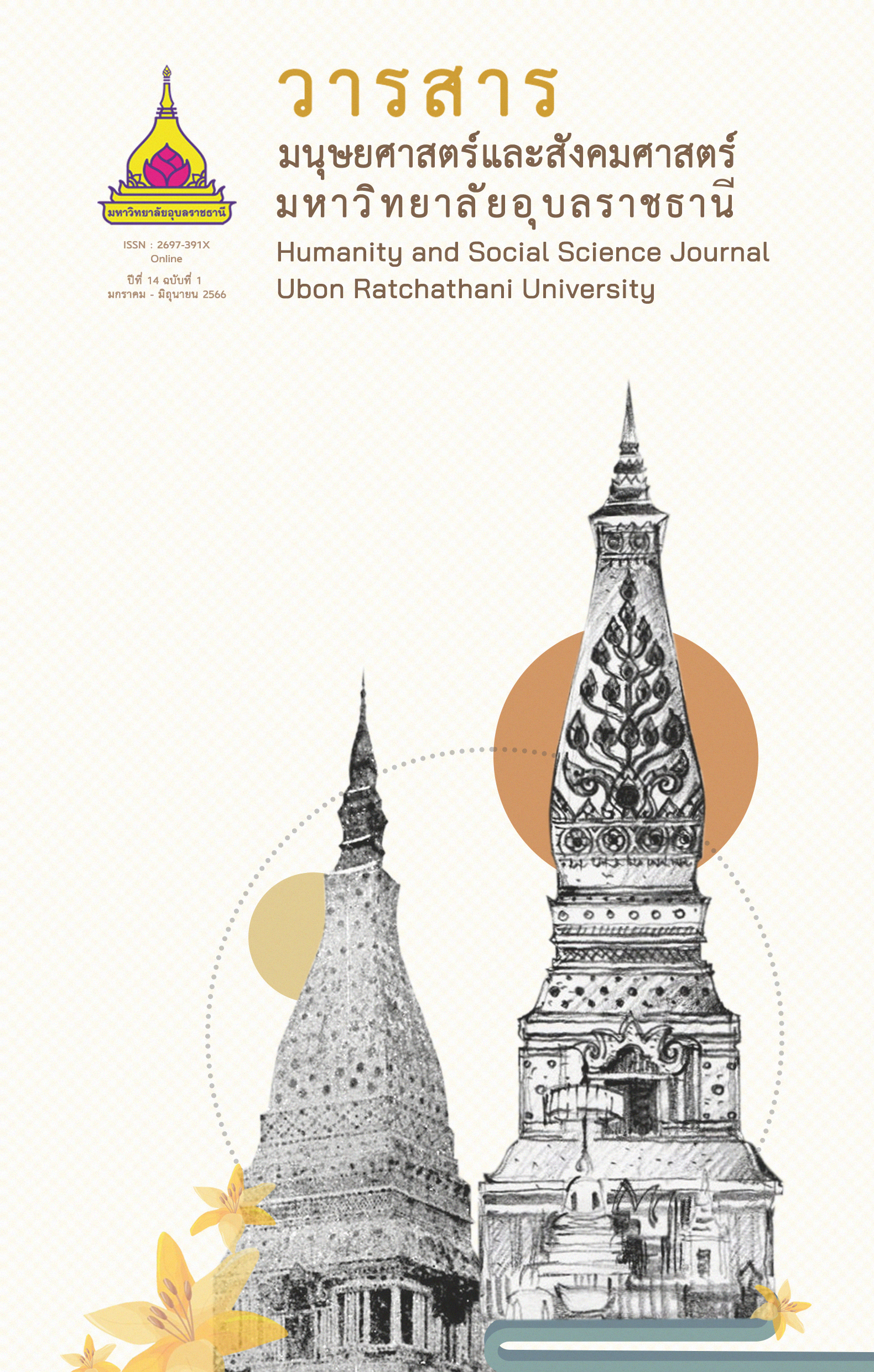สติ การสนับสนุนทางสังคม และลักษณะทางวัฒนธรรม ที่เกี่ยวข้องกับพฤติกรรมป้องกันการรับและแพร่เชื้อโรค ในที่สาธารณะของอาสาสมัครสาธารณสุขประจำหมู่บ้าน (อสม.) ตำบลโชคชัย อำเภอดอยหลวง จังหวัดเชียงราย
Main Article Content
บทคัดย่อ
ในยุควิถีใหม่การป้องกันตนเองจากโรคระบาดถือเป็นกิจวัตรประจำวันที่จำเป็นต้องปฏิบัติอย่างเข้มแข็งเพื่อการมีสุขภาพที่แข็งแรงของตนเอง รวมทั้งการไม่เป็นพาหะแพร่เชื้อโรคไปสู่ผู้อื่น การวิจัยทางพฤติกรรมศาสตร์นี้มีจุดมุ่งหมายเพื่อศึกษาอำนาจการทำนายของสติ การสนับสนุนทางสังคม และลักษณะทางวัฒนธรรมที่มีต่อพฤติกรรมป้องกันการรับและแพร่เชื้อโรคในที่สาธารณะของอาสาสมัครสาธารณสุขประจำหมู่บ้าน (อสม.) ในพื้นที่ตำบลโชคชัย อำเภอดอยหลวง จังหวัดเชียงราย จำนวน 147 คน โดยใช้แบบสอบถามที่มีค่าความเชื่อมั่นอยู่ระหว่าง .825-.927 วิเคราะห์สมมติฐานด้วยการวิเคราะห์ถดถอยพหุคูณแบบเชิงชั้น ผลการวิจัยพบว่า สติ การสนับสนุนทางสังคม และลักษณะทางวัฒนธรรม สามารถร่วมกันทำนายพฤติกรรมป้องกันการรับและแพร่เชื้อโรคในที่สาธารณะของอาสาสมัครอาสาธารณสุขประจำหมู่บ้าน (อสม.) ได้ร้อยละ 25.50 โดยมีตัวแปรสติด้านการรู้ตัว และการสนับสนุนทางสังคมด้านข้อมูลข่าวสารและสิ่งของเป็นตัวแปรที่มีอิทธิพลต่อพฤติกรรมป้องกันการรับและแพร่เชื้อโรคในที่สาธารณะอย่างมีนัยสำคัญทางสถิติที่ระดับ .01 (β=.350 และ .352) ผลการวิจัยนี้ชี้ให้เห็นถึงความสำคัญที่จะนำไปสู่การศึกษาและพัฒนาพฤติกรรมสุขภาพในเชิงปฏิบัติการจนถึงการกำหนดเป็นแนวทางการปฏิบัติงานของพื้นที่ต่อไปในอนาคต
Article Details

อนุญาตภายใต้เงื่อนไข Creative Commons Attribution-NonCommercial-NoDerivatives 4.0 International License.
บทความที่ได้รับการตีพิมพ์เป็นลิขสิทธิ์ของวารสารมนุษยศาสตร์และสังคมศาสตร์ มหาวิทยาลัยอุบลราชธานี
ข้อความที่ปรากฏในบทความแต่ละเรื่องในวารสารวิชาการเล่มนี้เป็นความคิดเห็นส่วนตัวของผู้เขียนแต่ละท่านไม่เกี่ยวข้องกับมหาวิทยาลัยอุบลราชธานี และคณาจารย์ท่านอื่นๆในมหาวิทยาลัยฯ แต่อย่างใด ความรับผิดชอบองค์ประกอบทั้งหมดของบทความแต่ละเรื่องเป็นของผู้เขียนแต่ละท่าน หากมีความผิดพลาดใดๆ ผู้เขียนแต่ละท่านจะรับผิดชอบบทความของตนเองแต่ผู้เดียว
เอกสารอ้างอิง
Bandura, A. (1986). Social Foundations of Thought and Action: A Social Cognitive Theory. Engleewood Cliffs, NJ: Prentic-Hall, Inc.
Bhanthumnavin, D. (2007). Interactionism Model and Hypothesize Guidelines in Psycho-Behavioral Science in Thailand. Journal of Social Development, 9(1), 85-117. (in Thai)
Chuaboonchai, I., Sutawanatcha, S. and Kankarn, W. (2022). Effect of Social Support Combined with the Health Literacy Enhancement Program on Stress and Prevention Behavior on Coronavirus Disease 2019 among Village Health Volunteers in Ubon Ratchatani Province. Srinagarind Medical Journal, 37(3), 254-260. (in Thai)
Department of Diseases Control. (2021). Situation of Coronavirus Disease 2019. Emergency Operation Center, Department of Diseases Control. Retrieved May 5, 2021, form situation-no488-050564.pdf (moph.go.th). (in Thai)
Department of Diseases Control. (2020). Coronavirus Disease 2019 (COVID-19) in Thailand. Department of Diseases Control, Ministry of Public Health. https://ddc.moph.go.th/viralpneumonia/index.php. (in Thai)
Gawande, R., et al. (2019). Mindfulness Training Enhances Self-Regulation and Facilitates Health Behavior Change for Primary Care Patients: A Randomized Controlled Trial. Journal of General Internal Medicine, 34, 293–302.
Horan, K.A. and Taylor, M.B. (2018). Mindfulness and Self-compassion as Tools in Health Behavior Change: An Evaluation of a Workplace Intervention Pilot Study. Journal of Contextual Behavioral Science, 8, 8-16.
Issarasongkram, M., Boonprakong, T. and Chunkao, K. (2015). Knowledge and Practices in Control and Prevention of Communicable Diseases of Childcare Volunteers in Early Childhood Development Centers, Bangkok.Journal of Boromarajonani College Nursing, Bangkok, 31(2), 80-91. (in Thai)
Jaitea, S. (2018). The Lanna Health Cultural for Health Care. The Journal of Thammasat University Medical School, 18(2), 240-248. (in Thai)
Jaitae, S. (2016). Cultural Health in Li Watershed Community at Lamphun Province. The Journal of Baromarajonani College of Nursing, Nakhonratchasima, 22(2), 61-73. (in Thai)
Jamjumrus, C. (2021). Health Preventing Behaviors of COVID-19 Prevention among Village Health Volunteers at Uthai Thani Province, Thailand. Regional Health Promotion Center 9 Journal, 15(38), 645-658. (in Thai)
Kline, R. B. (2005). Principles and Practice of Structural Equation Modeling. 2nd (ed). Guilford Press.
Lakey, B., & Cohen, S. (2000). Social Support Theory and Measurement. In S. Cohen, L. G. Underwood, & B. H. Gottlieb (Eds.), Social Support Measurement and Intervention: A Guide for Health and Social Scientists. (pp. 29–52). Oxford University Press.
Limpawittayakul, M., et al. (2015). Perception, Learning and Related Factors of Thai Citizen’ toward Ebola Virus Disease (EVD) in 2015. Disease Control Journal, 41(1), 253-263. (in Thai)
Manmana, S., Iamsirithaworn, S. and Uttayamakul, S. (2020). Coronavirus Disese-19 (Covid-19). Journal Bamrasnaradura Infectious Diseases Institute, 14(2), 1-10. (in Thai)
Pentecostes, J.U. (1999). Individualism vs. Collectivism: Implication for Health Promotion. Philippine Journal of Psychology, 32(2), 127-135.
Praneetvatakul, B. and Bhanthumnavin, D. (2018). Psychosocial Correlates of Communicable Disease Preventive Behavior in Public Places for Undergraduate Students. Journal of Behavioral Science for Development, 10(1), 83-103. (in Thai)
Praneetvatakul, B. (2017). Psychosocial as Correlates of Communicable Disease Preventive Behavior in Daily Life of Undergraduate Students [Master’s thesis, National Institute of Development Administration]. (in Thai)
Sakdapat, N. (2021). Psychosocial Factors Related to the COVID-19 Prevention Behaviors of Undergraduate Students. Journal of Behavioral Science, 27(2), 39-62. (in Thai)
Sala, M., et al. (2019). Trait Mindfulness and Health Behavior: A Meta-Analysis. Health Psychology Review, 14(6), 1-49.
Sangprasert, P. (2018). Effect of Mindfulness Practice of Health Behavior and Quality of Life in Hypertensive Patient [Doctoral dissertation, Thammasat University]. (in Thai)
Seangdoung, S. (2017). Volunteering and the Causal Relationship Model of Volunteering Behavior and the Retention of Volunteer Work among Public University Staff [Doctoral dissertation, Srinakharinwirot University]. (in Thai)
Sribunrueng, W., et al. (2021). Factors Affecting Prevention Behavior of COVID-19 Infection in Bangkok. Udon Thani Rajabhat University Journal of Humanities and Social Science, 10(1), 195-206. (in Thai)
Suvannathat, J. (1995). Principle of Behavioral Science: Theory, Research and Application. Journal of Behavioral Science, 1(1), 17-21. (in Thai)
Suwanwomg, Y., Gowittaya, M. and Amattayakul, K. (2016). Development of Lifelong Learning Model to Enhance a Health culture for Thai Society. Journal of Education Studies, 44(4), 96-114. (in Thai)
Thamcharoen, T., Lertwatthanawilat, W. and Kaewthummanukul, T. (2019). Attitude, Subjective Norm, Perceived Behavioral Control and Intention to Prevent Middle East Respiratory Syndrome Infection among Registered Nurses. Nursing Journal, 46(3), 14-24. (in Thai)
Triandis, H.C. and Gelfand, M.J. (1998). Converging measurement of horizontal and vertical Individualism and collectivism. Journal of Personality and Social Psychology, 74, 118-128.
Triandis, H.C. (1995). Individualism-Collectivism and Personality. Journal of Personality, 69(6), 907-924.
Turton, A. (2007). The Concept “Praxis” and The Practice of Anthropologists. Journal of Social Sciences, 20(2), 55-72.
Yeunyow, T. and Boonserm, P. (2020). The Relationship between Knowledge and Attitude toward Prevention Behavior of Coronavirus 2019 (COVID-19) among Female Village Health Volunteers (VHV), Surin Province. Medical Journal of Srisaket Surin Burirum Hospital, 35(3), 555-564. (in Thai)


